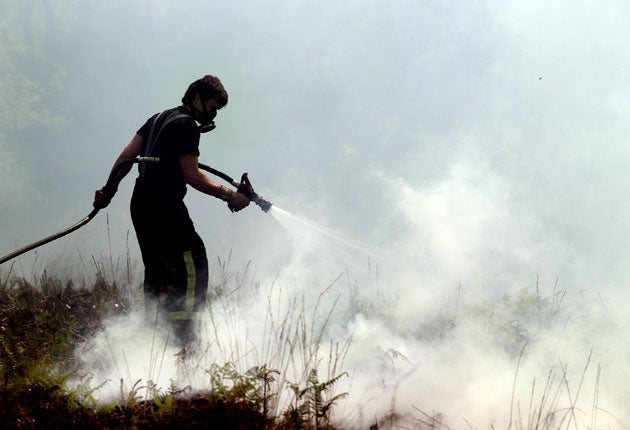Ministers call emergency summit as drought looms
One of the driest springs on record has sparked fears for agriculture and wildlife, while crews 'work to the point of exhaustion' to battle forest fires

Your support helps us to tell the story
From reproductive rights to climate change to Big Tech, The Independent is on the ground when the story is developing. Whether it's investigating the financials of Elon Musk's pro-Trump PAC or producing our latest documentary, 'The A Word', which shines a light on the American women fighting for reproductive rights, we know how important it is to parse out the facts from the messaging.
At such a critical moment in US history, we need reporters on the ground. Your donation allows us to keep sending journalists to speak to both sides of the story.
The Independent is trusted by Americans across the entire political spectrum. And unlike many other quality news outlets, we choose not to lock Americans out of our reporting and analysis with paywalls. We believe quality journalism should be available to everyone, paid for by those who can afford it.
Your support makes all the difference.Ministers are to hold an emergency drought summit in an attempt to avert a crisis caused by one of the driest springs on record.
A battle plan will be devised tomorrow, as Britain faces the prospect of hosepipe bans, food price rises and more forest fires sweeping the country. April had just 24 per cent of the average rainfall for the month, while several areas experienced the driest March for nearly 50 years.
Firefighters have already been working "to the point of exhaustion" to tackle forest fires, while farmers are warned that if river levels continue to fall the amount of water they can extract for crops may be limited.
It is not all bad news. Experts say a dry blossom season could help pollination for apple, cherry and pear trees, and there should be a bumper crop of strawberries in time for Wimbledon next month.
Tomorrow, Caroline Spelman, the Secretary of State for Environment, Food and Rural Affairs, will convene a high-level summit to draw up a blueprint for dealing with drought conditions this summer. "We need to be properly prepared for prolonged dry conditions – and anything that can be done now to lessen harm to crops, wildlife or rivers, and to minimise the effect on households, should be done – and done quickly," Ms Spelman said.
Among those attending the Whitehall talks are the industry body Water UK, the UK Irrigation Association, the National Farmers' Union, Natural England, the Environment Agency, the Horticultural Trades Association and British Waterways. Officials from the Department for Communities and Local Government responsible for fire policy will also attend.
And on Friday water companies will publish reports on their preparedness for the likely impact of climate change, including wetter winters and hotter, drier summers.
Jenny Bashford, NFU water policy adviser, said: "Farmers and growers are once again facing some extreme conditions, but they are well versed in dealing with the vagaries of the weather. Whatever weather issues are faced, it is always the increased cost to the farm for feed, bedding, impacts on crop growth and price that cause concern."
The Fire Brigades Union claims the Government has so far failed to respond to the growing pressure posed by climate change. With fire services facing cuts of up to 25 per cent over four years, the risk of wild fires spreading out of control is growing. Matt Wrack, the FBU general secretary, said: "Increasingly dry and warm weather has created perfect conditions for the huge increase in wildfires so far this year. Fire crews have been working to the point of exhaustion to protect their local communities."
According to the latest statistics from the Environment Agency, just 61 per cent of expected rain fell in the past three months, leading to reduced river levels in some areas.
Some businesses that use river water have had to reduce the amount they take, while some reservoirs are below the expected level for the time of year.
The agency is also concerned about the impact on wildlife, including fish and plant life in and around rivers and lakes. Trevor Bishop, head of water resources, said: "During dry weather it is even more important that water is used efficiently, and the needs of the public, business and the environment are balanced."
Sarah Mukerjee, of Water UK, said conditions had been "exceptionally dry" in some places, and while water firms have not yet brought in hosepipe bans, if the current weather continues "they can't rule it out". She added: "Everyone's looking at the sky and thinking 'when is it going to rain?'"
David Cameron has admitted farmers face "real issues" as a result of the dry weather, and tomorrow Tory MP Therese Coffey will hold a Commons debate on the threat to agriculture.
Join our commenting forum
Join thought-provoking conversations, follow other Independent readers and see their replies
Comments